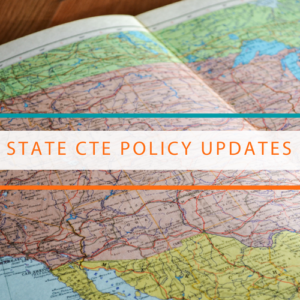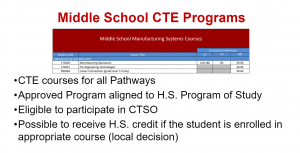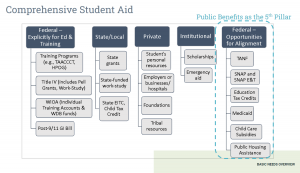 I could not be more delighted to join the team here at Advance CTE! A self-proclaimed “Career Technical Education (CTE) evangelist,” I’ve spent much of my career designing, implementing and supporting policies and practices that create the conditions for high-quality CTE to flourish, and have had the pleasure to learn from and work alongside the Advance CTE team and members over those years. As a former State CTE Director and Advance CTE member, it is an honor to be able to give back to an organization that has given so much to me and to the field at large.
I could not be more delighted to join the team here at Advance CTE! A self-proclaimed “Career Technical Education (CTE) evangelist,” I’ve spent much of my career designing, implementing and supporting policies and practices that create the conditions for high-quality CTE to flourish, and have had the pleasure to learn from and work alongside the Advance CTE team and members over those years. As a former State CTE Director and Advance CTE member, it is an honor to be able to give back to an organization that has given so much to me and to the field at large.
I am a Buckeye through and through, having spent nearly two decades either learning or teaching at The Ohio State University. As a sociologist by training, the driver at the heart of my work has always been reducing inequality. After many years of conducting research and teaching research methods, statistics, and substantive sociology courses at The Ohio State University, I became enthralled with the promise that CTE holds to prepare learners to achieve their aspirations.
That passion took me to the Ohio Department of Education where I spent seven years serving the learners of Ohio, designing state-level policy and practice solutions to strengthen and scale CTE in the state while simultaneously closing long-standing access and performance gaps across student groups. During my tenure at the Ohio Department of Education, I had the opportunity lead the development of the state’s CTE Report Card and CTE-focused pathways to high school graduation, as well as the state’s efforts to launch and scale middle-grade CTE and better align education and workforce by identifying and incentivizing credentials of value in CTE programs.
Immediately prior to joining the Advance CTE team, I served as the Vice President for Policy at the Linked Learning Alliance where I worked with states and communities to design and implement policies that support college and career pathways that intentionally integrate high-quality CTE, rigorous academics, early postsecondary opportunities, and work-based learning experiences. I also spent several years as the Director of Career Readiness at Education Strategy Group, where I led the firm’s work on credentials of value and worked with states and communities to plan, implement, and scale high-quality, industry-aligned pathways.
I am based in Columbus, Ohio where I live with my large blended family which includes four teenagers along with my 21-year old, five dogs, and my lovely husband Geoff. For the first time this school year, I get to play another role in the CTE system – that of a CTE parent. Outside of work, you can find me in the garden, cooking, or shuttling kids around to volleyball and basketball activities.


 On March 31, 2023, Idaho’s governor signed into law House Bill 267 which established the Idaho Career Ready Students Program. This program creates additional opportunities for students in grades seven through twelve to experience CTE through the creation of an eleven-person governing council and a pool of grant funding to be given to new CTE programs proposed by local education agencies (LEAs). This is a supplemental, separate initiative from the state’s current CTE program of study approval process.
On March 31, 2023, Idaho’s governor signed into law House Bill 267 which established the Idaho Career Ready Students Program. This program creates additional opportunities for students in grades seven through twelve to experience CTE through the creation of an eleven-person governing council and a pool of grant funding to be given to new CTE programs proposed by local education agencies (LEAs). This is a supplemental, separate initiative from the state’s current CTE program of study approval process.  Developing environmental literacy in elementary, middle and high school is essential to prepare learners for an evolving economy and to equip them with the skills and experiences they need to tackle urgent environmental challenges, both globally and in their own communities. By 2030, it is estimated that 24 million green jobs will be created in industries ranging from energy to finance and transportation.
Developing environmental literacy in elementary, middle and high school is essential to prepare learners for an evolving economy and to equip them with the skills and experiences they need to tackle urgent environmental challenges, both globally and in their own communities. By 2030, it is estimated that 24 million green jobs will be created in industries ranging from energy to finance and transportation. Career advising and development supports geared towards middle grades learners to improve access and achieve high-quality and equitable secondary CTE programs prove to be an early opportunity to develop an occupational identity and better build social capital. Ohio discussed the policy structures the state has put into place to support learners in CTE programs before they enter high school, including funding mechanisms and alignment of middle grades programs of study. Michigan Advance CTE-ECMC Fellow
Career advising and development supports geared towards middle grades learners to improve access and achieve high-quality and equitable secondary CTE programs prove to be an early opportunity to develop an occupational identity and better build social capital. Ohio discussed the policy structures the state has put into place to support learners in CTE programs before they enter high school, including funding mechanisms and alignment of middle grades programs of study. Michigan Advance CTE-ECMC Fellow  An education consultant and a state leader from Wisconsin provided an overview of programs that support learners basic needs, while elevating that many programs still create barriers for learners to complete credentials. Immediate next steps that were shared included making integrated benefits applications for federal assistance programs available online and inviting benefits coordinators to provide services on campus. Wisconsin highlighted their steps to create affinity groups with faculty and staff, with Dr. Colleen McCabe stating “To understand the effects of poverty, you have to explore learners’ multiple identities.”
An education consultant and a state leader from Wisconsin provided an overview of programs that support learners basic needs, while elevating that many programs still create barriers for learners to complete credentials. Immediate next steps that were shared included making integrated benefits applications for federal assistance programs available online and inviting benefits coordinators to provide services on campus. Wisconsin highlighted their steps to create affinity groups with faculty and staff, with Dr. Colleen McCabe stating “To understand the effects of poverty, you have to explore learners’ multiple identities.” The Delaware Department of Education recently named Jon Wickert as its new Director, Career and Technical Education (CTE) and Science, Technology, Engineering, and Mathematics (STEM) Initiatives. His path to state CTE leadership reflects the power of career exploration and social capital that will sustain ‘The First State’s’ strong record of innovation and transformation of CTE systems.
The Delaware Department of Education recently named Jon Wickert as its new Director, Career and Technical Education (CTE) and Science, Technology, Engineering, and Mathematics (STEM) Initiatives. His path to state CTE leadership reflects the power of career exploration and social capital that will sustain ‘The First State’s’ strong record of innovation and transformation of CTE systems.  Build Your Future is hosting a construction video contest, I BUILT THIS, and giving away more than $20,000 in prizes. Learn more and submit a video
Build Your Future is hosting a construction video contest, I BUILT THIS, and giving away more than $20,000 in prizes. Learn more and submit a video